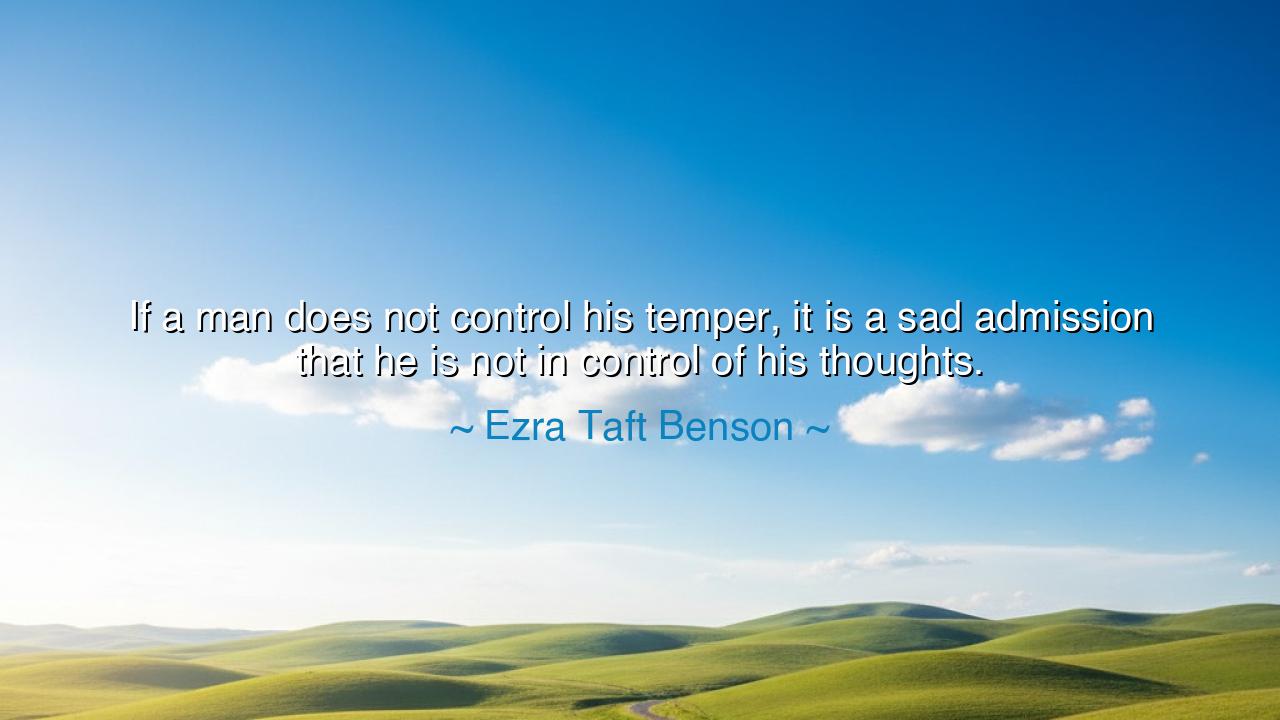
If a man does not control his temper, it is a sad admission that
If a man does not control his temper, it is a sad admission that he is not in control of his thoughts.






Hear the words of Ezra Taft Benson, carved with the weight of wisdom: “If a man does not control his temper, it is a sad admission that he is not in control of his thoughts.” This is no simple admonition, but a truth as old as civilization itself: that the measure of a person is not in their strength of arm or sharpness of tongue, but in their mastery of self. For the one who is enslaved by anger is not master of his own mind, but a servant to chaos within.
The ancients knew this law. The Stoics of Greece and Rome—Epictetus, Seneca, and Marcus Aurelius—taught that true power lies in the governance of the self. To rage is easy, they said, but to govern rage requires greatness. For when a man loses his temper, he lays bare the weakness of his thoughts, showing that his reason has been overthrown by impulse. In that moment, he is less ruler of himself than captive of passion, and what is more tragic than to be enslaved by one’s own nature?
History gives us countless warnings. Consider Alexander the Great, who conquered empires but failed, in one fatal moment, to conquer his temper. In a drunken fury, he struck down Cleitus, his loyal friend who had once saved his life. When the haze of anger lifted, Alexander wept bitterly, realizing he had slain not an enemy, but a brother of his soul. All the kingdoms he ruled could not restore the man his rage had destroyed. Thus we see: even the greatest conqueror may fall, not by the sword of another, but by the fire of his own uncontrolled mind.
Yet let us not think this weakness belongs only to kings and generals. In every household, in every street, anger unchecked sows ruin. A harsh word spoken in wrath may wound deeper than a blade. A decision made in fury may destroy years of labor. When a man cannot control his temper, he proves, as Benson declares, that he has lost control of his thoughts—for reason and judgment are drowned beneath the storm. Such a one cannot lead, cannot teach, cannot love rightly, for he has forsaken the throne of his own mind.
But there is hope, for self-mastery is not beyond reach. The ancients taught that discipline is a training, as the athlete trains his body. Through practice, one may catch the spark of anger before it becomes a flame. Through reflection, one may bend the passions into servants of reason. It is no sin to feel anger, for all are human; but it is folly to let anger reign. True strength is to feel the fire rise, and yet to command it, to speak with restraint, to act with wisdom, and not with fury.
The lesson for us is clear: do not boast of ruling others until you can rule yourself. A house cannot stand if its master is ungoverned; a nation cannot flourish if its leaders are slaves to wrath. Cultivate patience as you would cultivate a field. Guard your tongue as you would guard a treasure. In moments of anger, pause; in moments of insult, breathe. Let your thoughts be your master, not your prisoner. For the one who governs himself is fit to govern others, and the one who commands his own passions is truly free.
Therefore, practical action must follow. Each day, examine your heart. Ask: did anger rule me, or did I rule it? Practice silence in moments of provocation; write your thoughts instead of speaking them in fury; seek counsel before acting in haste. These are the disciplines of the wise, the shields of the strong. For temper unbridled is destruction, but temper mastered is power.
Thus, Benson’s words endure as ancient teaching: the failure to control temper reveals the loss of thought, and such loss is a sorrowful defeat. But the mastery of the self—though harder than conquering armies—is the noblest of victories. Let every man and woman, therefore, strive for this: to be sovereign over the mind, to be captain over the passions, and to walk in the strength of calm. For this is the path of wisdom, and this is the foundation of true greatness.






AAdministratorAdministrator
Welcome, honored guests. Please leave a comment, we will respond soon